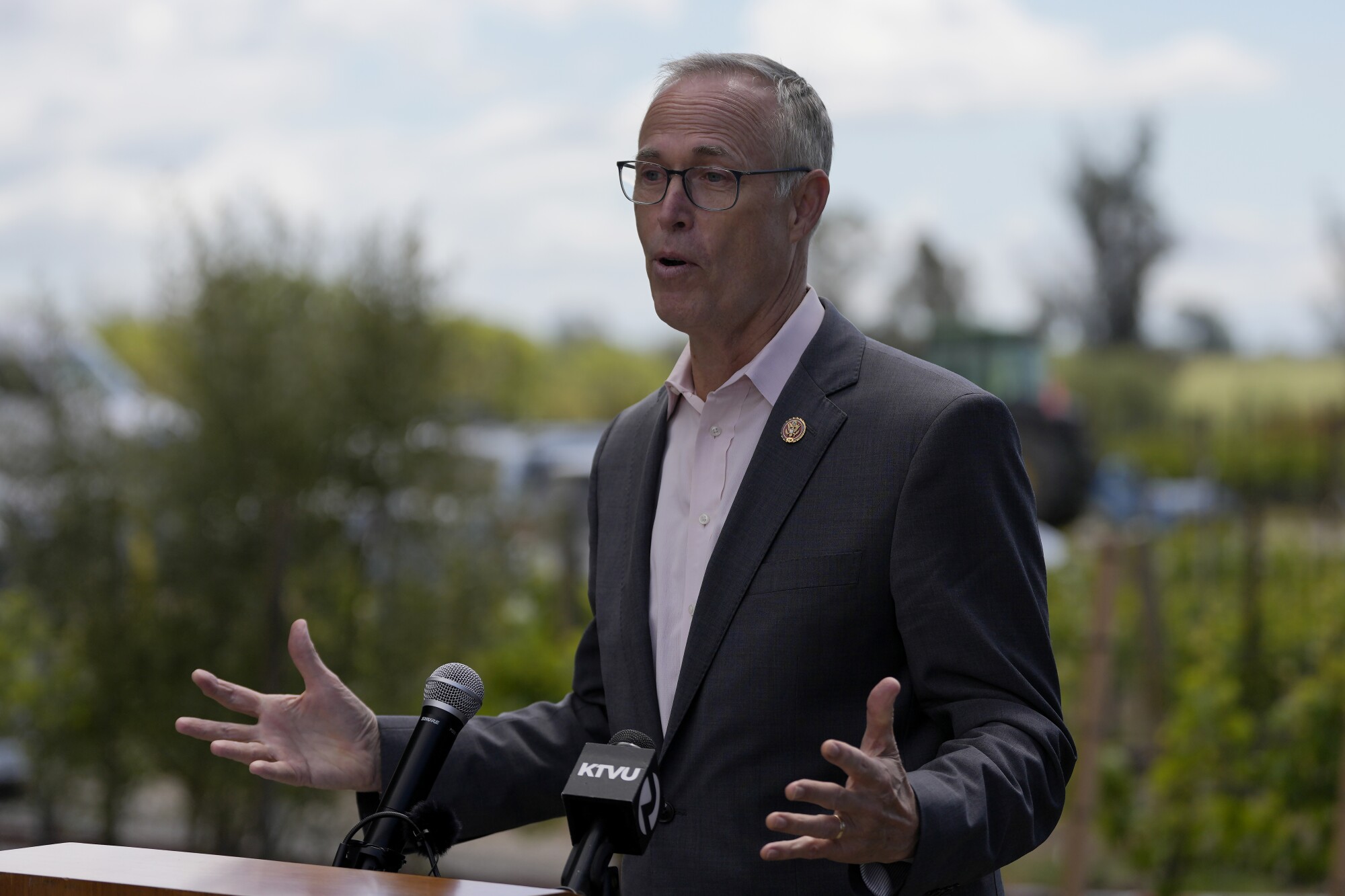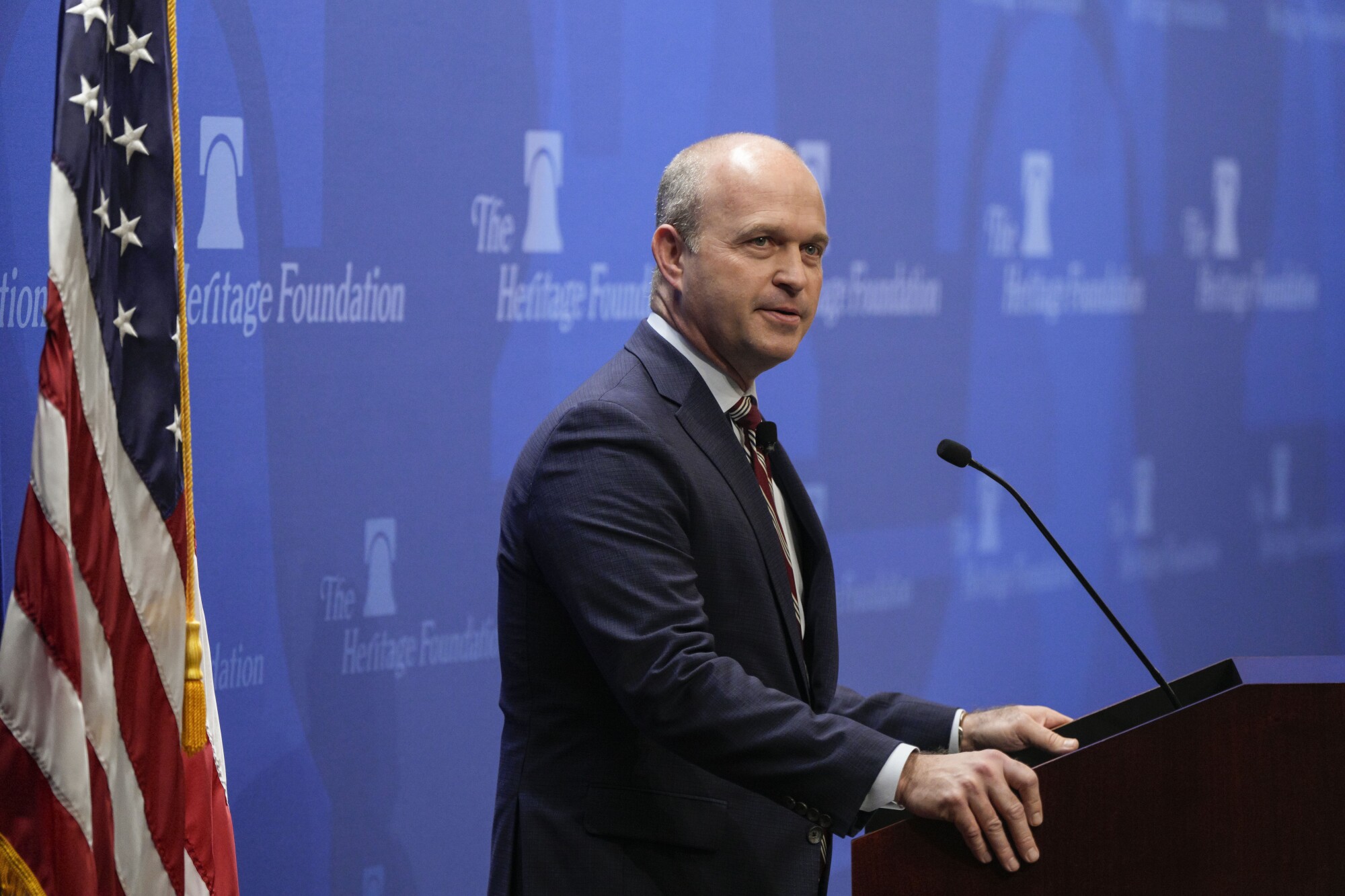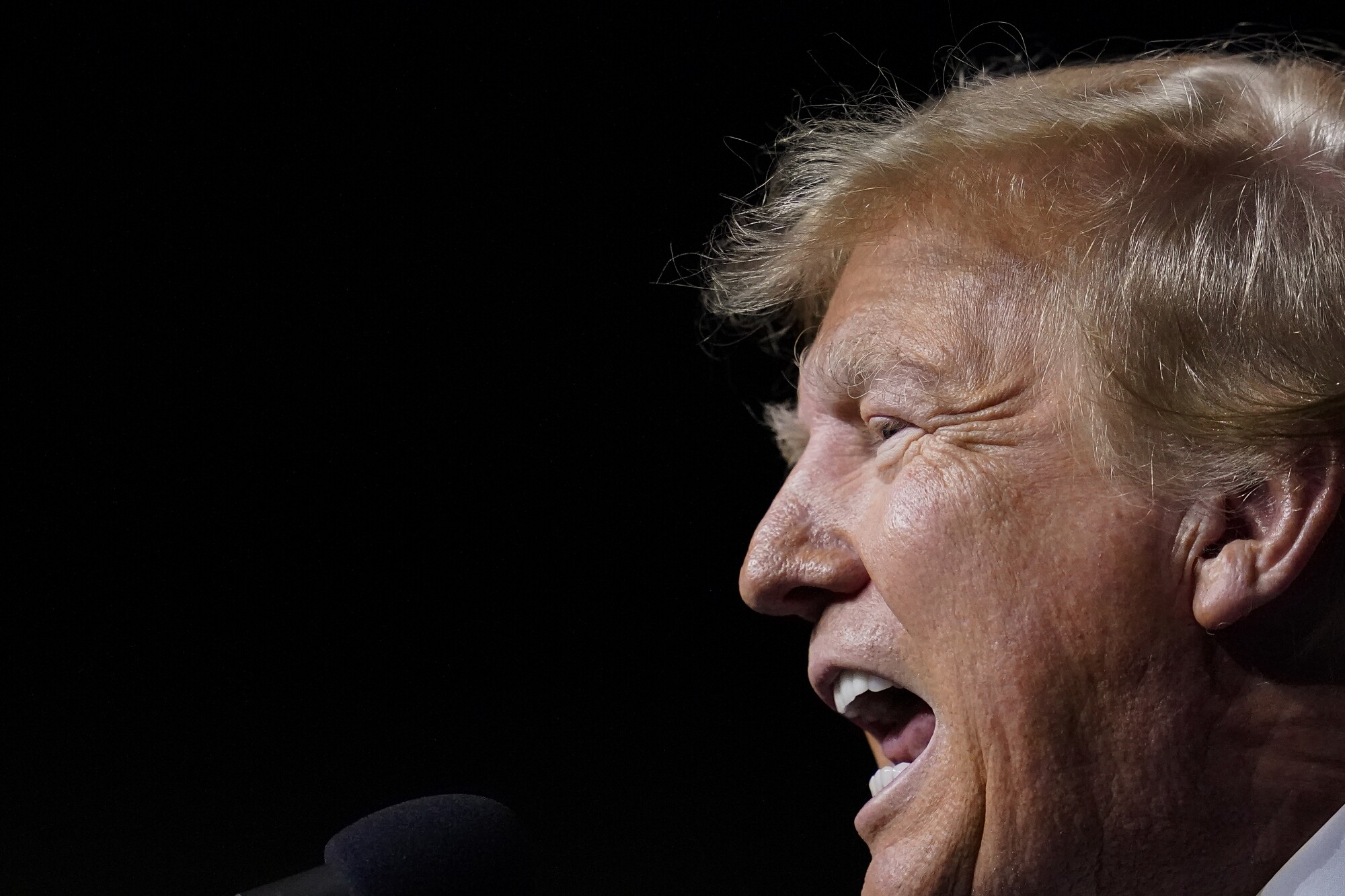There’s a good reason Donald Trump and his campaign are so desperate to distance themselves from the classified-sounding “Project 2025”: The Heritage Foundation’s blueprint for a second Trump administration is politically radioactive.
A Democratic operative who has seen private polling on how a number of issues could move the 2024 presidential election — like health care, the economy and immigration — told NOTUS that, improbably, no issue was benefiting Democrats more than Project 2025. And, predictably, Democrats are capitalizing on the unpopular plan.
Democratic lawmakers and campaign operatives are trying to attach Trump and Republicans to Project 2025 at every opportunity, which, it turns out, hasn’t been too hard. According to Rep. Jared Huffman, the founder of the “Stop Project 2025 Task Force,” one of the reasons they’ve had such success connecting Trump to Heritage’s plan is because voters intuitively believe the former president would institute many of these proposals if he gets another chance in the White House.
“There’s no believability gap here,” Huffman told NOTUS. “People have seen enough of Donald Trump in his first presidency and of JD Vance and all of these extremists to know that they’re not kidding. This is not some hypothetical think tank document; this is actually their blueprint. It’s just not hard to convince people that’s the case.”
Huffman also said he’d seen polling on how effective the Democratic attacks on Project 2025 have been — and he suggested there was a simple reason the attacks were landing. “The heart of why Project 2025 is having such a profound impact is that it’s true. It’s just true,” he said.
The asymmetry of what Democrats have had to do to connect Republicans to Project 2025 — which isn’t much — compared to the lengths Trump and other GOP lawmakers have had to go to distance themselves from it is one of the reasons this has been such a political winner for Democrats.
***
For months now, Republicans have been tearing their hair out over the best way to handle the Project 2025 controversy.
“There came a point at which people realized, ‘Oh, you might have actually done something that jeopardizes Heritage’s influence in the next administration,” a person familiar with the organization told NOTUS.
The Heritage Foundation did not respond to a detailed request for a comment, but the internal atmosphere at Heritage has been uneasy since Project 2025 began receiving outsized attention.
In the words of the person familiar with the organization, what started as a “fun” targeting by Democrats and the media took a nightmarish turn for staff when the project earned Trump’s public wrath. Now, there’s nothing “fun” about the situation.
“People are legitimately worried,” the source said.
While Heritage shrugged off the initial blowback, the group seemed to pivot toward downplaying the plan once it became clear the ramifications were no laughing matter. But ignoring the problem also hasn’t been working.
Democrats continue to hammer Republicans on Project 2025. And on Thursday, a Democratic group began launching “microsites” tying certain House Republicans to the blueprint.
Sources suggested that while Heritage may have been prepared for some repercussions, hardly anyone anticipated that Trump would have to disavow the project so directly.
“I was not surprised that he didn’t want to be associated with it,” said Brian Darling, a Republican operative who is Heritage’s former director of government relations. “But I didn’t understand why the tone was so harsh and over the top.”
“Over the top” is an appropriate description, considering the events of last month. Starting July 5, after it became obvious that Democrats were dedicated to refining Project 2025 into political kryptonite, Trump’s private frustration spilled into public. In a series of social posts, speeches and statements, the former president and his campaign disowned Project 2025 with increasing finality.
The episode concluded with the downfall of Project 2025 Director Paul Dans, who some see as a scapegoat for Heritage President Kevin Roberts’ decision-making.
“Hindsight is 20/20,” a current Heritage staffer told NOTUS. “Nothing is perfect, and — when you look back — there are always mistakes you could fix or stuff you could’ve done better.”
But Heritage has been on a collision course with Trump for some time. And much of the blame is currently falling on Roberts, whose leadership decisions have at times frustrated the Trump campaign.
For one, Roberts was keen on Gov. Ron DeSantis during the GOP presidential primary. He even drove around with a DeSantis bumper sticker, according to the person familiar. Some staff felt it was wrong for Heritage’s president to show public partiality toward a candidate — particularly one not named Trump.
The concern proved prescient when DeSantis’ campaign flopped.
Another example of Roberts’ missteps was the decision to heavily market Project 2025.
Since the Reagan administration, Heritage has compiled a detailed conservative agenda called the “Mandate for Leadership.” But in previous years, the compilation of conservative policy ideas wasn’t published until the summer before the election. It would usually sit in a filing cabinet until after November when it would be handed over to a Republican commander in chief.
Out of zeal, greed or something else entirely, Heritage leadership changed the formula for this election. It gave their efforts that ominous name that seems to convey nothing and everything — Project 2025 — and advertised its plan early and often across social media, at events, and, most importantly, to donors.
At multiple points during his campaign, Trump’s team used public and private channels to get Heritage’s attention, imploring them to tone it down. Eventually Roberts got the message, and Heritage took a step back from its public promotion of Project 2025. But the silence was only temporary.
***
In recent days, Roberts has actually started defending the conservative blueprint once again.
In a post on X on Tuesday, Roberts touted an article on right-wing news outlet Blaze Media that cited polling — commissioned by Heritage — that revealed that “many of Project 2025’s policy proposals are neither fringe nor unpopular.”
🚨New @Heritage polling:
— Kevin Roberts (@KevinRobertsTX) August 13, 2024
“It turns out that many of Project 2025's policy proposals are neither fringe nor unpopular… the data suggests they find resonance with majorities across states such as Pennsylvania, Michigan, Wisconsin, and Ohio.” pic.twitter.com/aeCU3sgsrR
While Roberts was clearly in search of some good news, the actual polling wasn’t exactly the good news he presented.
It’s true that, in this poll, some of the policies promoted in Project 2025 were popular — expanding oil and gas drilling on federal lands, reducing regulations and cutting government spending all polled well — but those ideas usually poll well.
More telling, for political purposes, were questions like, “Based on what you know, do you support or oppose Project 2025?”
For that question, 47% of respondents said they strongly oppose (38%) or somewhat oppose (8%) Project 2025. Meanwhile, only 14% of respondents said they strongly support (4%) or somewhat support (10%) Project 2025. (Nearly 40% of respondents said they were unsure.)
Heritage, of course, would prefer to focus on the next question, which presented a more favorable view of Project 2025, claiming it was an “initiative not affiliated with any candidate that makes a set of policy recommendations to the next presidential administration.”
“These recommendations include action to secure the border, unleashing domestic energy production, reducing inflation, and defending America against global threats,” the description continued.
But even that description failed to completely flip the script. Combined support did jump to 52% (26% strongly). But 36% still opposed Project 2025, and another 12% said they were still unsure even with the favorable description. In short, the plan is no political winner.
***
The truth is, Roberts has been defending Project 2025 for a lot longer than just a few days this week. Heritage started spreading the gospel of Project 2025 again this spring, with Roberts and Dans both reengaging the media.
Sources pointed to a desire to please donors as a reason for the marketing shift, with one saying certain aspects of the project were played up for the sake of “having something flashy to show the donors.”
Indeed, Project 2025 was supposed to be flashy. The blueprint was a $22 million line item in Heritage’s budget, which sources suggested was a considerable amount of money even for one of the best financed conservative think tanks.
In contrast, the transition project commissioned by the America First Policy Institute — an organization founded by Trump administration official Brooke Rollins — has received minimal scrutiny from the media or Democratic campaigns. AFPI has not heavily marketed its project, content to leave it out of sight until after Trump potentially wins in November.
Which is far from a guarantee. The race is a toss-up, and the polling shows that Democrats making Project 2025 a campaign punching bag is paying off. But again, Democrats say they haven’t had to do much to convince voters this is a bad plan.
“We’re not trying to mislead anyone,” said Huffman. “We’re showing them the 920-page radical blueprint that these guys were stupid enough to publish.”
Internally, when the Democratic attacks first started, Heritage staff relished the onslaught. But the delight turned to dismay when Trump and other Republicans started signaling they were uncomfortable with the blueprint, according to that source familiar with the organization.
Still, the organization’s leadership, specifically Roberts and Dans, opened the door to Democratic criticism of Trump’s affiliation with Project 2025 by overstating Heritage’s influence with the Trump campaign, the source familiar said.
Roberts reportedly claimed that Trump was supportive of the project, and Dans told Politico in June that project organizers were in contact with Trump and his team. (Trump offered his own general praise of the project at a Heritage conference in 2022, during the nascent stages of its development.)
***
As much as Trump’s slander stunned folks inside the Heritage offices, mutinous feelings toward the former president never emerged. They’re stuck in a rut, and the quickest escape is to make sure Trump wins, antagonism be damned.
“No one prefers that the Republican nominee for president disparage Heritage,” the current staffer said. “However, we all also want the conservative nominee for president to win. At the end of the day, to be successful in our work to improve the country, a conservative candidate has to win.”
Tellingly, plenty of staff aren’t that worried about Trump’s friendly fire. They believe any frustration the former president feels toward Heritage won’t last beyond the election, and it won’t impact Heritage’s influence in a potential Trump administration.
“If Heritage has no influence, why is everyone so concerned with Heritage’s influence?” the current Heritage staffer asked. “You can’t have it both ways.”
One source who was dubious of potential retribution against those involved with Project 2025 pointed to VP nominee JD Vance. He’s an example, this person said, of Trump’s capability of forgiveness. And they pointed out how meekness has rarely won over the former president. It’s better to be brash and then apologetic in Trumpworld than timid and then obsequious.
“Anybody that has heard President Trump for even one second knows that when he speaks, he goes all in, so I don’t really put all that much stock in a powerful response,” said a person who formerly held a leadership role at Heritage. “I don’t think somebody like Kevin Roberts at Heritage Foundation, who’s got that Texas hide, is really too bothered by it.”
But there’s one problem with that theory: Democrats are counting on the same thing.
The idea that the clock will time out on his Heritage frustration after November is just one more blitz in the Democrats’ playbook to convince people that a vote for Trump is a vote for Project 2025.
“Nobody believes them at this point when they try to act like they don’t know each other,” said Huffman. “There’s just too many receipts.”
A collective of contributors with strong ties to Trump dot the author’s page for the “Mandate for Leadership.” Some names are well known. Dans, Russ Vought, Peter Navarro, Ben Carson — each cut from the cloth of Trump’s previous administration, laying out ideas that largely align with the Trump campaign’s official plan for his potential presidency.
The presence of Trump-flavored politicos wasn’t limited to the pages of the mandate, however. Within the virtual hallways of the Presidential Administration Academy is a teaching staff of lesser-known appointees, handpicked straight from Trump’s vineyard.
***
The academy is an online Project 2025 program created to train potential lower-level appointees. Over 14 hours of recorded lectures, obtained and published by ProPublica earlier this week, the outlet identified 29 of the 36 speakers in the videos as people who previously worked for Trump in some capacity.
Among them is current Trump spokesperson Karoline Leavitt, a former assistant press secretary in the Trump White House, who was tasked with distancing the Trump campaign from Project 2025 in the official comment for the ProPublica story.
But the speakers in the training videos weren’t exclusively Trump-affiliated. Some also served under Presidents George W. Bush and Ronald Reagan. Previous iterations of the “Mandate for Leadership” also included contributions from former administration appointees, but sources noted Heritage was particularly successful in engaging people with experience under Trump to help with Project 2025.
Despite the project’s troubled time in the spotlight, each source defended its vision, saying it’s important for conservatives to have established policy ideas that can be discussed and considered. They also argued that the policies Democrats and the media have been highlighting aren’t indicative of the entire book, pointing out that most who critique the project have not read it. Pinned atop the project’s X account is a fact-check of a post from actor Mark Hamill, whose viral post claimed a litany of Project 2025 offenses that weren’t actually in Project 2025.
“There are a lot of people who think that Kevin is doing everything right, and that the project is doing everything right, and that Heritage needs to burn down Washington to save America,” the person familiar with the organization said. “And then other people are like, ‘Well, maybe we should ask ourselves if we did something wrong here. You know, maybe the Trump campaign is upset for a reason.’”
Whether Trump and his campaign are upset by Project 2025’s hubris or its polling impact is the real question. The former president’s first statement, released during the turmoil following Joe Biden’s debate performance, at least wished Heritage luck as he sought distance from what was then one of the only political weapons in the Democrats’ arsenal.
But a later statement, issued by Trump’s campaign managers after Dans’ departure, had a sharper bite, welcoming the project’s demise and serving notice to anyone “trying to misrepresent their influence with President Trump and his campaign — it will not end well for you.”
That hasn’t exactly been great news for those who hoped for future jobs through Project 2025.
One local Republican official, who requested anonymity to speak openly, enrolled in the Presidential Administration Academy after hearing about Project 2025 last year.
“I thought, ‘This is amazing,’” the official told NOTUS.
But after all the consternation, this GOP official stopped the course.
“Why am I going through this if it’s not an on-ramp into the administration?” this person asked.
—
Ben T.N. Mause is a NOTUS reporter and an Allbritton Journalism Institute fellow.
Editor’s Note: This piece has been corrected to note that Brooke Rollins founded AFPI.
Sign in
Log into your free account with your email. Don’t have one?
Check your email for a one-time code.
We sent a 4-digit code to . Enter the pin to confirm your account.
New code will be available in 1:00
Let’s try this again.
We encountered an error with the passcode sent to . Please reenter your email.






